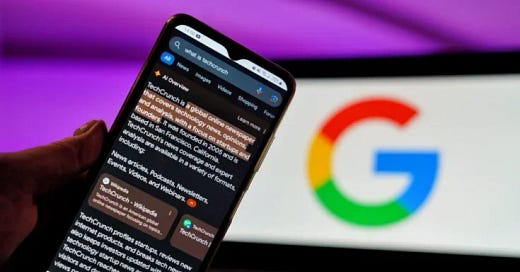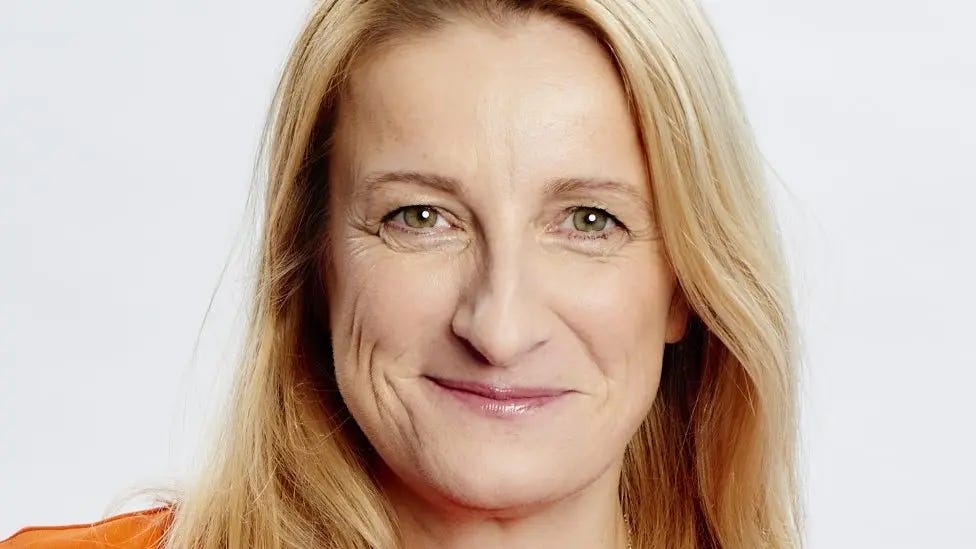How Google forced publishers to accept AI Overviews | Trump dilemma for editors
And The Atantic editor Jeffrey Goldberg speaks out over Signalgate
The search giant considered allowing publishers to opt out of AI summaries and still appear in search, but decided this was a "hard red line" because "this is evolving into a space for monetisation".
Google made around £20bn in advertising revenue last year in the UK (more than ten times the amount going to every commercial publisher combined). Yet it still chose to force the news industry into appearing in AI overviews by making it impossible to opt out without also becoming rarely invisible on search. Given Google is the internet for 90% of web users in the UK, this was clearly not an option.
It is a clear abuse of Google's monopoly position which can't be addressed soon enough by the Competition and Markets Authority in the UK under new powers outlined in the Digital Markets, Competition and Consumers Act.
Today we also have two exclusive reports from last week's star-studded Sir Harry Evans Investigative Journalism Summit in London.
Atlantic editor Jeffrey Goldberg spoke about the Signalgate scoop and the importance of standing up to a Trump regime which has escalated from media name-calling to launching multi-billion-dollar lawsuits: "The only way to operate in this environment is to refuse to be bullied".
During the first Trump presidency the debate was around whether journalists should repeat the president's lies. Now the challenge is how to cover a bewildering deluge of presidential policy announcements and future plans, only some of which will ever come to fruition.
Of course US political journalists have to cover everything Trump does but somehow publishers also need to work out a way of flagging to readers/viewers which announcements are nonsense and which are worth paying attention to.
On Press Gazette
How Google forced publishers to accept AI scraping as price of appearing in search
NYT and Reuters editors respond to concerns Trump is purposely overwhelming news media.
New York Times editor Joe Kahn defends publishing Trump story every half hour
NYT and Reuters editors respond to concerns Trump is purposely overwhelming news media.
The Atlantic editor Jeffrey Goldberg: ‘The market understands what a quality story is’
Goldberg also discussed his addition to a Trump administration group chat, describing it as "too stupid to be believed".
News in brief
Wales Online has revealed that a "relaunch" of Welsh news website The National, previously launched and closed by Newsquest, was filled with stolen AI-written stories for the ad revenue, often ranking top on Google due to the legitimacy of the domain. (Wales Online)
The Foreign Office has reportedly asked the BBC to draw up a budget of up to £70m a year lower than it has said it needs over the next few years amid cuts to aid. (The Guardian)
Lawyers for the BBC told the High Court on Friday it had "multiple, authoritative, credible, confidential" sources corroborating information provided anonymously to a Spotlight programme in a libel action brought by ex-Sinn Fein leader Gerry Adams. (Irish Times)
Senior media figures joined the creative industry in a letter urging Government support for proposals that would protect copyright in the AI age ahead of a Lords vote today. Signatories included CEOs: Piers North (Reach), Anna Jones (Telegraph), John Ridding (FT), Chris Dicker (Candr). And editors: Ted Verity (Mail), Gary Shipton (National World).
A Sky show that saw comedians Josh Widdicombe and Nish Kumar join newsrooms at National World (in the first series) and Newsquest (second series) has been cancelled. (The Sun)
Also on Press Gazette
Premium news subscriptions offset falling tabloid web audience for News Corp
Police told to do better to fill information void like one that fuelled Southport riots
‘Search is going off a cliff’: CNN, BBC and Economist chiefs on future of news
OpenAI content boss on Google ‘ten blue links’ and arrival of ChatGPT search
‘Search is going off a cliff’: CNN, BBC and Economist chiefs on future of news
Impartial Reporter stems print decline and grows digital sales as it turns 200
Latest podcast: Alison Phillips on crime, tabloids and positive news
Former Mirror editor Alison Phillips talks to Press Gazette's Dominic Ponsford as she launches a new weekly podcast called Crime Scene with former Metropolitan Police chief Bernard Hogan-Howe.





